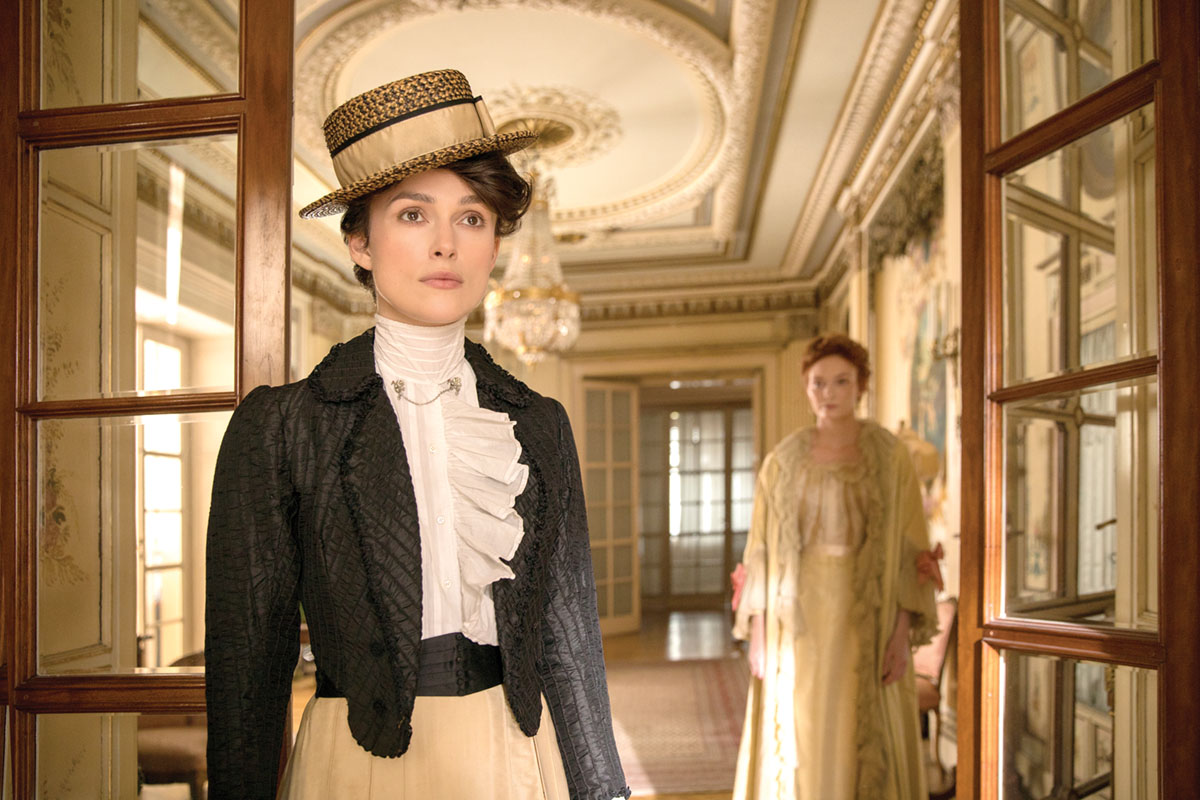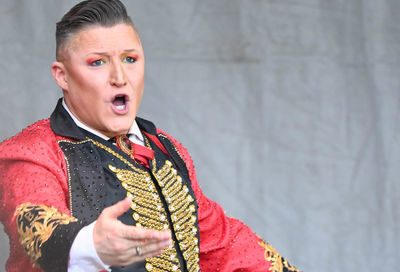Film Review: Keira Knightley shines in “Colette”
Keira Knightley's latest star turn takes her to the salons of turn-of-the-century Paris

Someone, somewhere, stands firmly convinced that Keira Knightley represents a sort of ideal of continental glamour and style. The current face of the quintessentially French brand Chanel, Knightley now stars as the quintessentially French novelist Sidonie-Gabrielle Colette in the spare but lusty biographical drama bearing the single name by which the writer became known to the world.
But in Colette (★★★½), the laissez-faire sensuality of the semi-louche libertine seems not to come naturally to Knightley. Her performance more precisely recalls the sturdy, determined English girl who first lit up the screen in Bend it Like Beckham.
The actress has won fans and acclaim portraying variations on that theme of chin-up, shoulders-back brio ever since, usually while swanning about enviable locales, dressed in the finest period costumes. As Colette, she stretches not far from what audiences have seen her do before — and yet, she’s riveting as the blossoming artist in fin de siècle Paris. Knightley takes command of this story of a woman discovering the full scope of her powers and talents. Moreover, she’s well-matched by an incisive script — co-written by the film’s director, Wash Westmoreland, Richard Glatzer, and Rebecca D. Lenkiewicz — and her co-star Dominic West as the titular character’s lout of a husband, the even more famous (at the time) writer Henry Gauthier-Villars, known by his nom-de-plume, Willy.
Willy and Colette, who is 14 years his junior, become the toast of 1890s Paris with the publication of “his” novel Claudine à L’école, a provocative account of a country schoolgirl’s coming-of-age. Led by Willy’s propensity for self-promotion, the couple presents the novel as a perfect marriage of Colette’s girlhood experiences and Willy’s genius for capturing her precocious spirit in his writing.
Of course, Colette is the one who actually wrote the book, and all the subsequent Claudine novels. Following Willy’s advice to dash the stories with “more spice, less literature,” she delivers what become instant best-sellers. But her true contributions to Willy’s success stay hidden behind the larger-than-life man’s fame and reputation. Willy closely guards the fact that he oversees a stable of ghostwriters, into which he conscripts his wife. Although Colette bristles at the arrangement, she accepts it. To a degree, Willy has her believing that were it not for him, she never could have produced anything great, and without him, she won’t continue to do great things.

The film chronicles the writer’s feminist awakening, as it’s aroused by her parallel sexual awakening to freedoms that previously had been solely the privilege of men in marriage. For example, Colette is fine with Willy taking a lover or two, but only if he accepts that she does the same. Her affairs include Georgie Raoul-Duval (Eleanor Tomlinson), a fiery society wife just arrived in Paris from Louisiana, and Marquise de Belbeuf (Denise Gough), a wealthy androgyne nicknamed Missy.
Colette is nothing if not sophisticated in its treatment of the mores and appetites of the Paris salon set. Colette is depicted as a girl who might not know independence, but she understands desire. And what she doesn’t understand, she learns quickly, be it in the drawing room or the bedroom. Afforded several opportunities to portray Colette’s lightbulb epiphanies, both in the creative and carnal realms, Knightley lends fierce expression to the character’s sparks of imagination.
Meanwhile, the film overall portrays the world’s lightbulb moment, as Willy and Colette live through the advent of the typewriter, the automobile, and widespread indoor electrical lighting. Theirs was an era that absorbed monumental changes in technology and culture, and Westmoreland’s take on the headstrong novelist places her like a beacon at the cusp of this new age. Tracking those epochal shifts, the scale of the picture stays modest, while the lush wardrobe keeps up with Colette’s growing confidence to dress as suited her androgynous nature.
“I want to be part of things,” she pleads to Willy, and indeed, Colette becomes the celebrated center of a whirlwind of art, sex, and society. Knightley steps out of her comfort zone to embody the temptress at the height of her physical powers, flaunting her sexuality onstage in a series of modern dance and pantomime performances. While she doesn’t convey prowess as a dancer, she strongly registers the steely audacity that propels Colette onto the stage in the first place.
There’s no question of Colette’s indomitable determination to become herself. Westmoreland likens her process of becoming to the process of writing, a sometimes agonizing labor towards the ecstasy of filling page after page with a form of truth. And in order to accomplish that, she has to overcome the lie that only a man could create a sensational woman like her or Claudine. Yes, Willy teaches Colette and challenges her, but, whether this is a portrait of radical marriage or mentorship, Knightley’s performance makes clear that, ultimately, Colette is her own creation.
Colette, rated R, and opens on Friday, September 28 at the Landmark’s E Street and Bethesda Row Cinema. Visit landmarktheatres.com.
Support Metro Weekly’s Journalism
These are challenging times for news organizations. And yet it’s crucial we stay active and provide vital resources and information to both our local readers and the world. So won’t you please take a moment and consider supporting Metro Weekly with a membership? For as little as $5 a month, you can help ensure Metro Weekly magazine and MetroWeekly.com remain free, viable resources as we provide the best, most diverse, culturally-resonant LGBTQ coverage in both the D.C. region and around the world. Memberships come with exclusive perks and discounts, your own personal digital delivery of each week’s magazine (and an archive), access to our Member's Lounge when it launches this fall, and exclusive members-only items like Metro Weekly Membership Mugs and Tote Bags! Check out all our membership levels here and please join us today!



























You must be logged in to post a comment.